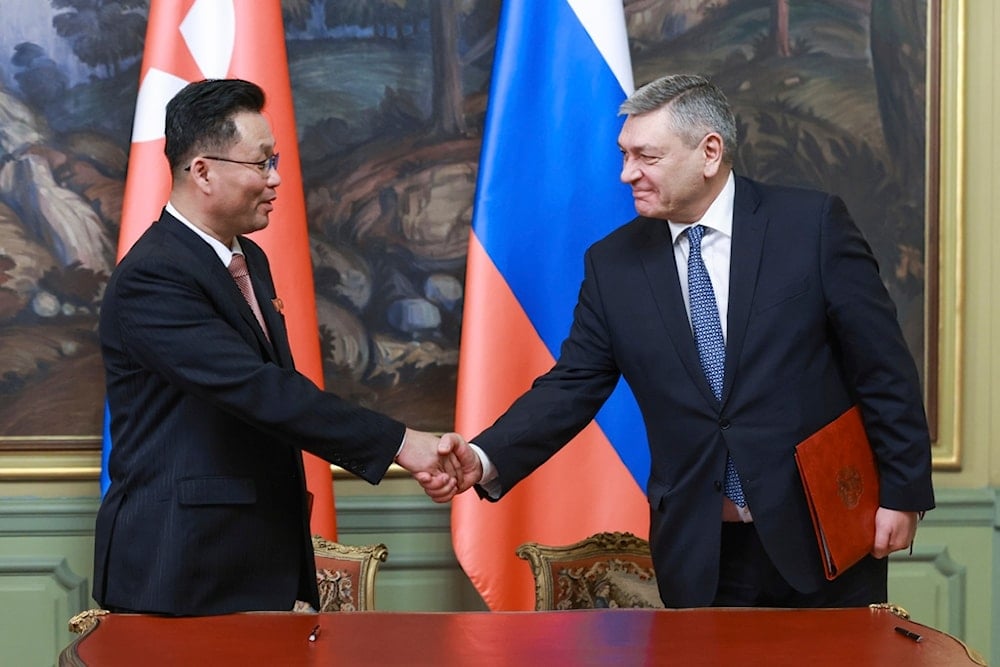Russia, DPRK unveil provisions of strategic partnership agreement
The joint agreement between Russia and the DPRK outlines common objectives and interests, ranging from military cooperation to media conservation.
-

Deputy FM Andrei Rudenko, right, and his counterpart Kim Jong Gyu shake hands as they sign a protocol on exchanging instruments of ratification in Moscow, Russia, December 4, 2024. (AP)
Russia and the Democratic People's Republic of Korea (DPRK) unveiled their comprehensive strategic partnership agreement on Thursday, aimed at fostering deeper cooperation across multiple domains, including media, security, and global stability. The agreement emphasizes joint efforts to confront shared challenges and promote mutual interests on the global stage.
The comprehensive strategic partnership agreement between Russia and the DPRK officially took effect on December 4 following the exchange of documents between both nations' deputy foreign ministers in Moscow, the Russian Foreign Ministery announced in a statement issued on Thursday.
According to the statement, Russian Deputy Foreign Minister Andrey Rudenko and DPRK Deputy Foreign Minister Kim Jong Gyu officiated the partnership after signing a protocol on the exchange of instruments of ratification.
"In accordance with Article 22, the treaty on comprehensive strategic partnership between Russia and [the DPRK] went into effect on December 4, 2024, the date of the exchange of instruments of ratification," it said.
Provisions of the agreement
According to the document, a central focus of the agreement is enhancing collaboration in the media sphere, with both parties committing to increase public awareness of their respective nations and bilateral relations.
The document highlights the need to promote objective information about Russia and the DPRK, advance cooperation in countering disinformation, and create favorable conditions for the interaction between national media outlets.
In the face of increasing global threats, both nations also agreed to unite in tackling critical issues such as food and energy security, information technology security, climate change, healthcare, and global supply chains. They went on to stress the importance of maintaining strategic cooperation to ensure the prosperity and stability of both nations.
"The parties will cooperate to jointly counter the growing challenges and threats in areas of strategic importance, including food and energy security, information and communications technology (ICT) security, climate change, healthcare, and supply chains," the document read.
"The development of relations of comprehensive strategic partnership between the parties meets the fundamental interests of their peoples and contributes to ensuring peace, regional and global security, and stability," it added.
Moreover, Russia and the DPRK outlined their joint commitment to support one another's peaceful policies, underscoring the protection of sovereignty, security, and the right to development, and expressed their alignment in striving for a multipolar global order, promoting equality and justice in international relations.
The nations further reiterated their stance on cybersecurity, advocating for equal rights for states in managing the global Internet network. They condemned the hostile use of information and communications technology (ICT) for undermining state sovereignty and security, declaring any attempts to limit nations' ability to regulate their national segments of the global network as unacceptable.
The agreement additionally details the nations' cooperation in preserving peace and security, including provisions for mutual assistance in the face of armed hostilities. Should either country face an immediate threat, bilateral consultations will be held to coordinate an adequate response and determine practical measures to neutralize the threat.
Commitment to joint efforts in combatting international terrorism, extremism, and organized crime was also significantly underlined throughout the document. Russia and the DPRK's cooperation will extend to social issues such as human trafficking, illegal migration, and financial crimes, reinforcing their shared goal of sustaining global peace and security.
Guided by the principles of international law, both nations pledged to consult and cooperate with and under global organizations such as the United Nations to address challenges that jeopardize their shared interests. The agreement also includes a provision prohibiting both nations from partaking in agreements with third parties that undermine each other's sovereignty or key interests.
Read more: Possible new axis emerging against Western hegemony: CNN

 4 Min Read
4 Min Read









